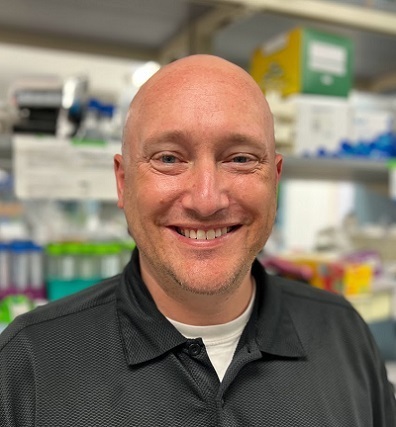Zachary Schafer Coleman Foundation Associate Professor of Cancer Biology

Research Interests:
Metastasis, the spread of cancer from the site of the primary tumor to distant locations in the body, is responsible for in excess of 90% of cancer deaths, yet the molecular mechanisms governing this complicated process remain poorly understood. Given this extraordinarily high mortality rate, there is a significant need for the development of novel therapeutic approaches that either eliminate metastatic cancer cells or eradicate incipient cancer cells prior to metastatic dissemination. It has become clear that an important barrier to metastasis is the induction of anoikis, a cell death process that is induced when epithelial cells lose integrin-mediated attachment to the extracellular matrix (ECM). Anoikis induction is not limited to cells that entirely lack ECM-attachment as even the attachment to abnormal or foreign ECM can induce cell death. As a result, cancer cells must resist anoikis at numerous junctures during tumor progression.
We have discovered that ECM-detachment can compromise cell metabolism in a fashion that prohibits cell survival. More specifically, ECM-detachment is a trigger for limiting nutrient uptake which results in diminished carbon flux through multiple metabolic pathways. As a consequence of these metabolic changes, ECM-detached cells can die in an anoikis-independent fashion. In contrast, the rescue of nutrient uptake and metabolic flux can block anoikis-independent cell death and facilitate the survival of ECM-detached cells.
This discovery opened up a number of additional questions regarding the molecular strategies deployed by cancer cells to successfully evade the induction of anoikis and overcome metabolic deficiencies. My lab has endeavored to answer these questions by pursuing an overarching goal to examine and characterize the biological mechanisms that permit cancer cell survival during tumor progression. There are three specific, multi-faceted research initiatives in my laboratory that each address this overarching goal in distinct ways:
- Mitophagy, mitochondrial biology, and non-apoptotic mechanisms of cell death during ECM-detachment.
- The intersection of signal transduction, metabolic reprogramming, and the tumor microenvironment.
- Iron metabolism during ECM-detachment and novel ferroptosis markers.
Please visit my lab website at https://schaferlaboratory.com/ for more details on each research initiative.
Biography:
- Coleman Foundation Associate Professor of Cancer Biology, Department of Biological Sciences, University of Notre Dame; 2015-Present
- Assistant Department Chair, Department of Biological Sciences, University of Notre Dame; 2019-2022
- Coleman Foundation Assistant Professor of Cancer Biology, Department of Biological Sciences, University of Notre Dame; 2009-2015
- Postdoctoral Fellow, Department of Cell Biology, Harvard Medical School; 2006-2009
- Ph.D., Molecular Cancer Biology, Duke University; 2006
- B.S., Biological Sciences, University of Notre Dame; 2001
Selected Papers:
- Lisa M. Hom, Seunghoon Sun, Jamie Campbell, Pinyan Liu, Shannon Culbert, Ireland M. Murphy, and Zachary T. Schafer. A role for fibroblast-derived SASP factors in the activation of pyroptotic death in mammary epithelial cells. J Biol Chem. 2023 Jun 14;299(7):104922. Link for Full Text.
- James H. Schofield and Zachary T. Schafer. Regulators Mount Up: The Metabolic Roles of Apoptotic Proteins. Front Cell Death. 2023 July. 2:1223926. Link for Full Text.
- Jianping He, Abigail M. Abikoye, Brett P. McLaughlin, Ryan S. Middleton, Ryan Sheldon, Russell G. Jones, and Zachary T. Schafer. Reprogramming of Iron Metabolism Confers Ferroptosis Resistance in ECM-Detached Cells. iScience. 2023 May 9;26(6):106827. Link for Full Text.
- Lisa M. Hom and Zachary T. Schafer. Assessment of metabolic pathways and parameters in extracellular matrix-detached cells. Methods Mol Biol. 2023;2675:309-315. Link for Full Text.
- Matyas Abel Tsegaye, Jianping He, Kyle McGeehan, Ireland M. Murphy, Mati Nemera, and Zachary T. Schafer. Oncogenic signaling inhibits c-FLIP expression and promotes cancer cell survival during ECM-detachment. Sci Rep. 2021 Sep 20;11(1):18606. Link for Full Text.
- Joshua A. Mason, Jordan A. Cockfield, Daniel J. Pape, Hannah Meissner, Michael Sokolowski, Taylor C. White, José C. Valentín López, Juan Liu, Xioajing Liu, Inmaculada Martinez-Reyes, Navdeep S. Chandel, Jason W. Locasale, and Zachary T. Schafer. SGK1 signaling promotes glucose metabolism and survival in extracellular matrix detached cells. Cell Rep. 2021 Mar 16;34(11):108821. Link for Full Text.
- James H. Schofield and Zachary T. Schafer. Mitochondrial Reactive Oxygen Species and Mitophagy; A Complex and Nuanced Relationship. Antioxid Redox Sign. 2021 Mar 1;34(7):517-530. Link for Full Text.
- Jordan A. Cockfield and Zachary T. Schafer. Antioxidant defenses: a context-specific vulnerability of cancer cells. Cancers (Basel). 2019 Aug 20;11(8). Link for Full Text.
- Mark A. Hawk, Cassandra L. Gorsuch, Patrick Fagan, Chan Lee, Sung Eun Kim, Jens C. Hamann, Joshua A. Mason, Kelsey J. Weigel, Matyas Abel Tsegaye, Luqun Shen, Sydney Shuff, Junjun Zuo, Stephan Hu, Lei Jiang, Sarah Chapman, W. Matthew Leevy, Ralph J. DeBerardinis, Michael Overholtzer, and Zachary T. Schafer. RIPK1-Mediated Induction of Mitophagy Compromises the Viability of Extracellular Matrix-Detached Cells. Nat Cell Biol. 2018 Mar; 20(3):272-284. Link for Full Text.
- Joshua A. Mason, Kimberly R. Hagel, Mark A. Hawk, and Zachary T. Schafer. Metabolism during ECM-Detachment: Achilles Heel of Cancer Cells? Trends Cancer. 2017 Jul;3(7):475-481. Link for Full Text.
- Joshua A. Mason, Calli A. Davison-Versagli, Amy K. Leliaert, Daniel J. Pape, Chelsea McCallister, Junjun Zuo, Sienna M. Durbin, Cassandra L. Buchheit, Siyuan Zhang, and Zachary T. Schafer. Oncogenic Ras differentially regulates metabolism and anoikis in extracellular matrix-detached cells. Cell Death Differ. 2016 Aug;23(8):1271-82. Link for Full Text.
- Cassandra L. Buchheit, Kelsey J. Weigel, and Zachary T. Schafer. Cancer Cell Survival During ECM-Detachment: Multiple Barriers to Tumor Progression. Nat Rev Cancer. 2014 Sep;14(9):632-41. Link for Full Text.
- Zachary T. Schafer, Alexandra R. Grassian, Loling Song, Zhenyang Jiang, Zachary Gerhart-Hines, Hanna Y. Irie, Sizhen Gao, Pere Puigserver, and Joan S. Brugge. Antioxidant and Oncogene Rescue of Metabolic Defects Caused by Loss of Matrix Attachment. Nature. 2009 Sep 3;461(7260):109-13. Link for Full Text.
- Zachary T. Schafer and Sally Kornbluth. The Apoptosome: Phyiological, Developmental, and Pathological Modes of Regulation. Dev Cell. 2006 May; 10(5): 549-561. Link for Full Text.